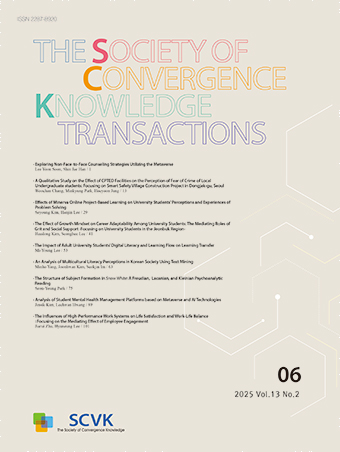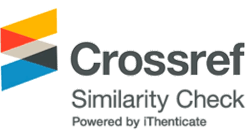Research Article
Abstract
References
Information
본 연구는 유방암 환자의 스트레스와 대처방식이 삶의 질에 영향을 미치는 과정에 문제중심 대처와 정서중심 대처의 매개효과를 확인하려는 목적으로 이루어졌다. 이를 위해 충청도와 경기도 소재 암생존자 119명을 대상으로 설문조사 한 자료가 사용되었다. 대상자의 스트레스와 삶의 질의 관계에서 문제중심 대처와 정서중심 대처의 매개효과 검증을 위해 Baron과 Kenny의 매개효과 분석 방법을 사용하였다. 분석 결과 첫째, 대상자의 문제중심대처 방식과 삶의 질에 미치는 영향이 있는 것으로 파악되었다(r=.253, p<.001). 둘째, 대상자의 정서중심대처 방식과 삶의 질에 미치는 영향이 있는 것으로 파악되었다(r=.275, p<.001). 셋째, 스트레스와 삶의질 관계에서 문제중심대처 방식과 정서중심대처방식의 매개효과가 확인되었다(문제중심 매개효과 Z=1.93, ρ<0.005, 정서중심 매개효과 Z=-0.299, ρ<0.001). 이에 유방암 환자의 스트레스와 대처방식이 삶의 질 증진을 위한 간호중재 방안에 대해 제언하였다.
In this study, we wanted to see whether problem-oriented coping and emotion-oriented coping had a mediating effect on the process in which stress and coping methods of breast cancer patients affect the quality of life. For this purpose, we used survey data from 119 cancer survivors living in Chungcheong-do and gyunggi-do. A method to verify the mediating effects of problem-oriented coping and emotion-oriented coping was used in the relationship between the subject’s stress and quality of life. Baron and Kenny’s mediation effect analysis is, first, to conduct a regression analysis of the effect of the independent variable on the mediating variable, and second, to conduct a regression analysis of the effect of the independent variable on the dependent variable. As a result of the analysis, first, it was found that the subject’s problem-oriented coping style had an effect on quality of life (r=.253, p<.001). Second, it was found that the subject’s emotion-oriented coping style had an effect on quality of life (r=.275, p<.001). Third, in the relationship between stress and quality of life, it was found that problem-oriented coping and emotion-oriented coping had a mediating effect (problem-oriented mediation effect Z=1.93, ρ<0.005, emotion-oriented mediation effect Z=-0.299, ρ<0.001). Based on the results of the study, the stress and coping methods of breast cancer patients described nursing intervention methods to improve the quality of life.
- F. Mols, et al., "Quality of life among long-term breast cancer survivors: A systematic review", European Journal of Cancer, Vol. 41, pp. 2613-2619, 2005.10.1016/j.ejca.2005.05.01716226458
- http://www.ncc.re.kr
- B.W. Park, and S.Y. Hwang, "Depression and coping in breast cancer patients", Journal of Breast Cancer, Vol. 12, No. 3, pp. 199-209, 2009.10.4048/jbc.2009.12.3.199
- J.E. Bower, et al., "Fatigue in breast cancer survivors: Occurrence, correlates, and impact on quality of life", Journal of Clinical Oncology, Vol. 18, pp. 743-53, 2000.10.1200/JCO.2000.18.4.74310673515
- M.C. Dorval, "Long-term quality of life after breast cancer; comparison of 8-year survivors with population controls", Journal of Clinical Oncology, Vol. 16, pp. 487-94, 1998.10.1200/JCO.1998.16.2.4879469332
- B.R. Ferrel, et al., "Quality of life in breast cancer survivors: implications for developing support services", Oncol Nurs Forum, Vol. 25, pp. 887-95, 1998.
- B.J. Oh, "A structural model for health promotion and quality of life in people with cancer", Korean J. Nurs., Vol. 26, pp. 632-52, 1996.10.4040/jnas.1996.26.3.632
- A. Sammarco, "Quality of life, social support, and uncertainty among Latina breast cancer survivors", Oncol Nurs Forum, Vol. 35, pp. 844-49, 2008.10.1188/08.ONF.844-84918765332
- 김민영, "항암화학요법 시행 초기 암환자의 증상 및 삶의 질 변화 양상", 대한간호학 회지, 제39권 제3호, pp. 433-445, 2009.
- G.T. Deimling, et al., "Cancer survivorship and psychological distress in later life", Psycho-Oncology, Vol. 11, No. 6, pp. 479-494, 2002.10.1002/pon.61412476430
- E. Bnou, et al., "Loss of resources as mediators between interpersonal trauma and traumatic and depressive symptoms among women with cancer", Journal of Health Psychology, Vol. 14, No. 2, pp. 200-214, 2009.10.1177/135910530810020419237487
- 박은영, 이은옥, "고위험군 유방암 환자의 치료과정에 따른 삶의 질의 변화", 종양간호학회지, 제1권 제1호, pp. 32-43, 2001.
- 이인정, "스트레스가 암환자의 삶의 질에 미치는 영향:외상후성장의 조절효과를 중심으로", 보건사회연구 제32권 제3호, pp. 522-557, 2012.
- 정복례, "유방암 환자의 적을과정에 돤한 연구- 정서적 경험을 중심으로", 연세대학교 대학원 박사학위 논문, 1991.
- 은영, "위암환자의 건강증진행위와 삶의 질 예측모형", 서울대학교 대학원 박사학위논문, 1994.
- 류은정, "자기효능과 원인지각을 이용한 암환자의 대처효과에 관한 이론적 구조모형", 중앙대학교 대학원 박사학위논문, 1999.
- R.S. Lazarus, and S. Folkman, "Stress, appraisal, and coping", New York: Springer Pub. Co., 1984.
- S. Folkman, and R.S. Lazarus, "If it changes it must be a process: Study of emotion and coping during three stages of a college examination", Journal of Personality and Social Psychology, Vol. 48, pp. 150-170, 1985.10.1037//0022-3514.48.1.1502980281
- C.J. Holahan, et al., "Coping, stress, resistance, and growth: Conceptualizing adaptive functioning. In M. Zeidner & N. M. Endler (Eds.), Handbook of coping", New York: Wiley & Sons, Inc., pp. 25-43, 1996.
- J.H. Amirkan, "A factor analytically derived measure of coping: The coping strategy Indicator", Journal of Personality and Social Psychology, Vol. 59, pp. 1066-1075, 1990.10.1037//0022-3514.59.5.1066
- C. Andreotti, et al., "Cancer, coping, and cognition: a model for the role of stress reactivity in cancer‐related cognitive decline", Psycho‐Oncology, Vol. 24, No. 6, pp. 617-623, 2015.10.1002/pon.368325286084PMC4387099
- 류은정, "암환자의 우울, 자기효능 및 대처간의 상관관계", 성인간호학회지, 제13권 1호, pp. 70-81, 2001.
- 노주희, 김성렬, 강경선, 권용순, "항암화학요법을 받는 부인암 환자의 영양장애, 우울 정도와 삶의 질과의 관계", 여성건강간호학회지, 제20권 제2호, pp. 117-125, 2014.
- 현동림, 김영숙, "선행항암화학요법을 받는 유방암환자의 불안, 불확실성, 암 대처가 삶의 질에 미치는 영향", 대한종양 간호학회지, 제22권 제1호, pp. 37-45, 2002.
- 임정원, "암 생존자 배우자의 심리적 디스트레스:가족 내 의사소통과 대처방식의 매개효과", 한국가족사회복지학회, 제1권, pp. 115-116, 2018.
- 이윤정, 함은미, 김금순, "일개지역 암환자의 불확실성과 대처 및 우울에 관한연구", Journal of Korean Academy of Nursing, 제31권 제2호, pp. 244-256, 2001.10.4040/jkan.2001.31.2.244
- B.J. Volicer, and M.W. Bohannon, "A hospital stress rating scale", Nursing Research, Vol. 24, No. 5, pp. 352-359, 1975.10.1097/00006199-197509000-000061041618
- 도희경, "암환자의 스트레스와 대처방법", 경희대학교 석사학위논문, 2008.
- 김은경, 박영숙, "부인암 환자의 건강증진행위, 스트레스 및 삶의 질", 재활간호학회지, 제13권 제 2호, pp. 114-222, 2010.
- 소향숙, "자궁경부암 환자의 치료시기별 불확실성 대처방식 및 우울의 변화양상", 연세대학교 박사학위논문, 1995.
- D.F. Cella, "Manual of the functional assessment of chronic therapy measurement system (version 4)", Northwestern: CORE Evanston Northwestern Healthcare and Northwestern University, 1997.
- FACIT. Org, http://www.facit.org/Questionnaires, 2010.
- R.M. Baron, and D.A. Kenny, "The moderator-mediator variable distinction in social psychological research: Conceptual, strategic, and statistical considerations", Journal of Personality and Social Psychology, Vol. 51, No. 6, pp. 1173-1182, 1986.10.1037//0022-3514.51.6.11733806354
- R.H. Hoyle, and G.T. Smith, "Formulating clinical research hypotheses asstructural equation models: A conceptual overview", Journal of Consultingand Clinical Psychology, Vol. 62, No. 3, pp. 429-440, 1994.10.1037//0022-006X.62.3.4298063970
- Publisher :The Society of Convergence Knowledge
- Publisher(Ko) :융복합지식학회
- Journal Title :The Society of Convergence Knowledge Transactions
- Journal Title(Ko) :융복합지식학회논문지
- Volume : 12
- No :1
- Pages :13-23
- DOI :https://doi.org/10.22716/sckt.2024.12.1.002




 The Society of Convergence Knowledge Transactions
The Society of Convergence Knowledge Transactions







